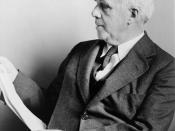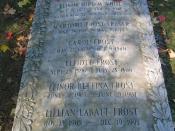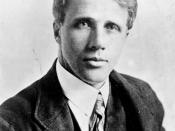The power of Mother Nature has always been envied, cursed, and awe-inspiring. In old Anglo-Saxon literature, most works were devoted to the sea, and in "The Seafarer" it applauds the sea, but at the same time the author has deference for its power. Robert Frost's "Nothing Gold Can Stay" also shows this devotion and despite the fact that their subjects differ, the ideas that the two poems are attempting to get across are not too different. In "The Seafarer," it continuously refers to the sea as the author's passion, even so he has respect for it, "My soul roams with the sea, the whales / Home, wandering to the widest corners / Of the world" (59-61B "The Seafarer"). Yet after the second half of the poem, it discusses what humanity is becoming, and how the world is "Kept spinning by toil. All glory is tarnished" (87 "The Seafarer").
Along with this idea that the world is slowly but surely coming to its demise, it says that nothing on this world can last forever ". . . but nothing / Golden shakes the wrath of God" (99B-100 "The Seafarer"). "Nothing Gold Can Stay" essentially fits this description also. "Natures first green is gold" (1 "Nothing Gold Can Stay). Even though it refers to a floral perspective, it can also be applicable to wha tthe author is trying to describe in "The Seafarer". By pointing out that nature's first green is gold, refering to the vegetative growth seen in spring, it sets up the reader for the last line "Nothing gold can stay" (8 "Nothing Gold Can Stay). The reader could take the passage to a literal or a figurative sense. Either the beginning of spring is something that is wonderful yet temporary, or...


